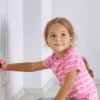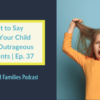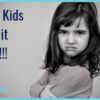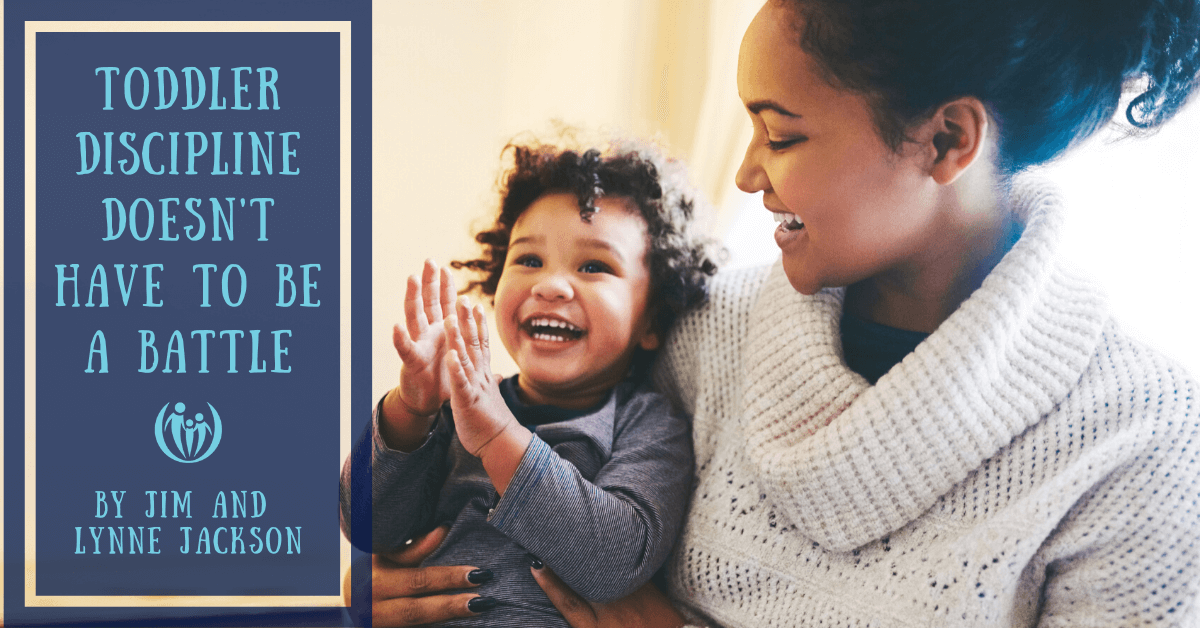
Toddler Discipline Doesn’t Have to Be a Battle
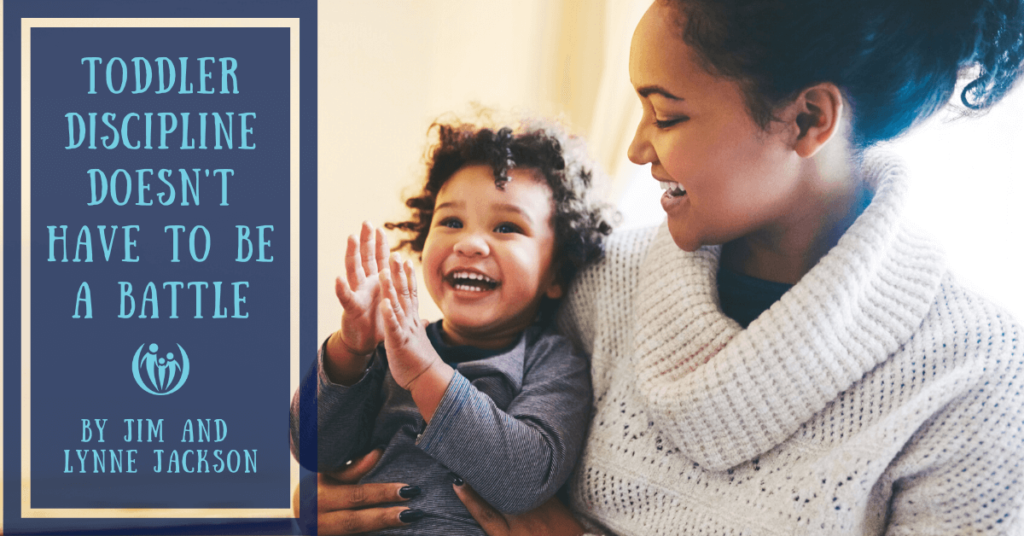
If you’ve got a toddler, is discipline a challenge? Sometimes those cute little people do really frustrating things! And it’s hard to know how to respond. But this mom knocked it out of the ballpark.
This story is such a great example of positive toddler discipline.
It started when two-year-old Sam asked for milk while waiting for breakfast. His mom, Rebekah, was happy to oblige and poured him a small cup. Sam was at a curious, exploratory stage of life. He didn’t want the milk so much for drinking, but for a little science experiment about liquids and gravity. So he poured it all out. Onto himself.
No crying over spilled milk
Not an easy moment. Her little toddler just intentionally spilled milk on himself! So frustrating.
The thing is, Rebekah had also studied the Connected Families Framework. She wanted to make sure that however she approached Sam in this moment, she continued sending him the messages: “You are safe” and “You are loved.”
She knew that toddler discipline (or big kid discipline) didn’t need to be punitive. Disciplining a child is discipling a child, and that could just mean teaching.
Rebekah had also noticed that Sam had begun to use simple cause and effect thinking. She wanted to develop that knowledge (“You are capable and responsible.”). The way she navigated this challenge is a great example of the Discipline that Connects messages in action with a little tyke.
You are SAFE and LOVED, even after spilling milk
Here’s more of that story as told by Rebekah:
Right when he spilled his milk he looked up at me. I smiled and said, “Uh oh, what happened? Is the milk all gone?” Sam replied with a grin of satisfaction.
Because Rebekah stayed calm and pleasant she communicated the message, “You are safe and loved.”
You are CAPABLE and RESPONSIBLE for cleaning up
Still holding onto my gentle composure and hoping to use this teachable moment I asked, “What do we need to do?”
Her question “What do we need to do?” communicated the message, “You are capable and responsible.”
“Clean up,” he replied, and I got a towel to for us to clean up the milk together.
Did you think toddler discipline was going to go that easily?
If he were an eight-year-old, that might have been the end of the story.
But for a toddler…
Everything was going fine when all of a sudden he started crying. He was upset about more than just spilled milk, but had no words for it, and I couldn’t figure it out at first. This intensified the crying.
As I felt my stress level and frustration begin to rise I held him in my arms trying to soothe him and asked a few more times with increasing intensity, “Why are you crying?!” This just led to more crying.
Rebekah had good intentions to help Sam express himself. But… When toddlers (and big kids) are upset, it’s really hard to answer “Why?” It’s too big a question with too many possible answers. It leaves the kids feeling more overwhelmed and even ashamed.
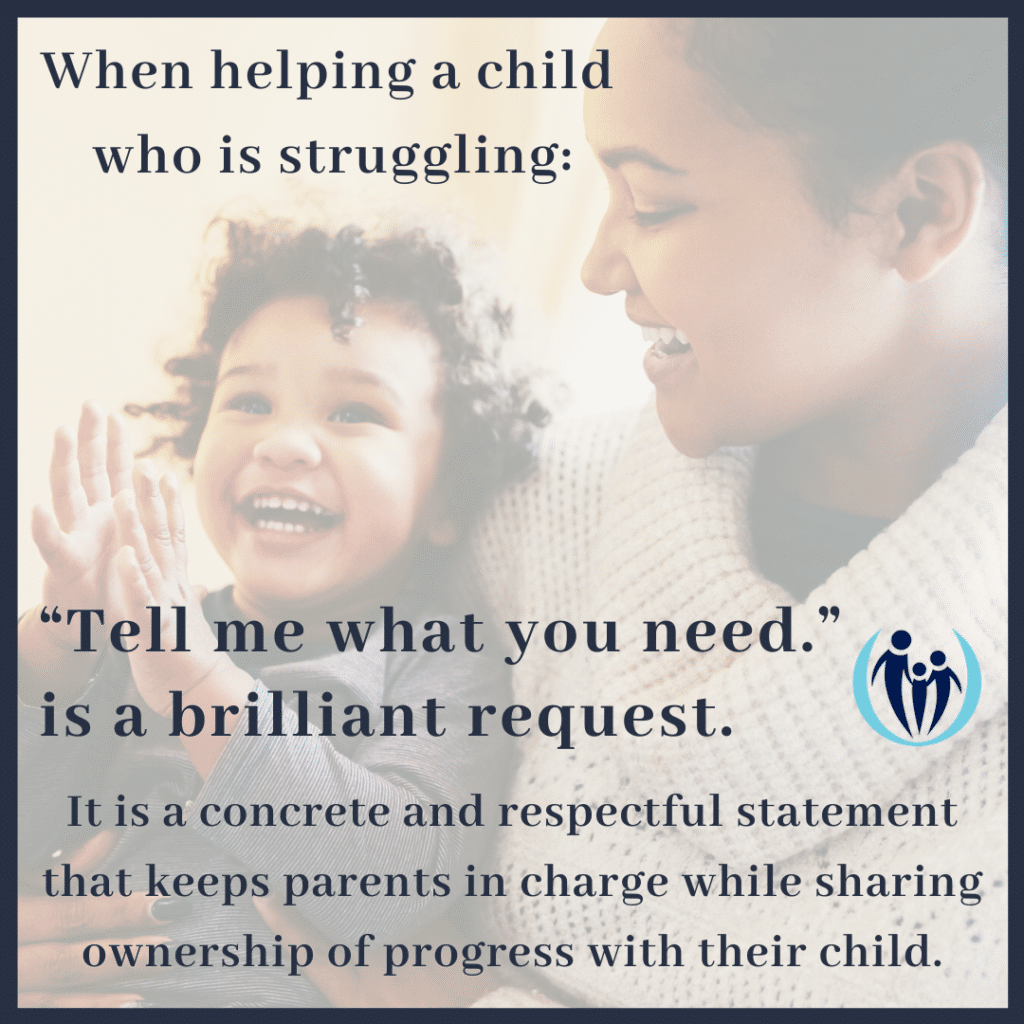
You are CAPABLE of problem-solving
What little kids need at times like this are concrete words they can identify with in the simplest of terms. Rebekah realized this.
She wanted to help Sam feel a sense of ownership and responsibility to solve his problem.
I took a deep breath and calmly requested, “Tell me what you need.”
He responded very quickly and adamantly with, “PANTS OFF!”
Once I was calm, Sam and I could communicate, as I tuned into his unspoken discomfort. “Pants off,” was all I needed to hear to know that he was getting wet inside and was upset by how it felt.
“Tell me what you need.” is a brilliant request. It is a concrete and respectful statement that keeps parents in charge while sharing ownership of progress with their child.
And, little toddler, you’re still SAFE and LOVED
Some parenting experts might say that because the best teacher is reality, Sam should be left to sit in his wet pants for a while. For some older kids, that could be true.
But a two-year-old is very unlikely to do any constructive learning while upset. Rebekah knew that by communicating safety and love to Sam, he would soon be open to some coaching.
Constructive toddler discipline comes from a place of emotional safety
I took him to his bedroom to clean up and change. I imagined if Sam had the vocabulary, he would say, “Silly Mommy, how could I eat breakfast while I’m so uncomfortable!?”
This insight helped me feel empathy for him before addressing the situation. While calmly changing his clothes I said, “We have to get your pajamas off because they are dirty. So Samuel, this is why we don’t dump out our…”
I waited for his response…
“MILK!” he said with a smile.
“Yes,” I replied with a big hug and a kiss! We both went back upstairs to enjoy our breakfast together, and we were still on time for our appointment. No more spilled milk!
Sam got it. Rebekah didn’t have to “punish” Sam or fume at him.
Cheerful, empathetic coaching as discipline
Parents ask all the time about disciplining toddlers. It’s not easy!
As frustrating as it can be when toddlers do illogical things, Rebekah captured what the majority of toddler discipline looks like. Cheerful, empathetic coaching goes a long way!
Rebekah built on the messages of safety and love to help Sam grow in wisdom and a sense of responsibility. She brilliantly created an opportunity for Sam to give a wise answer and to feel good about it.
Yes, even two-year-old kids are capable, if given the chance, to take responsibility for wise choices.
Rebekah told us this process took no more than 5 minutes. We know from years of parent coaching that this could have easily turned into a prolonged meltdown if she had responded harshly.
Instead, she acted in ways that deepened connection and accelerated Sam’s learning. You can do the same when you think to communicate the messages, ” You are safe, loved, capable, and responsible!” – even with a two-year old!
Related Posts
Questions for Reflection:
- When my toddler misbehaves, what’s it like to be him/her? (Thinking about this helps you calm down and gives insight into the best way to help.)
- What’s a simple question or statement I could use with my toddler or preschooler to help him/her figure out how to solve the problem created by the misbehavior? For example:
- Tell me what you need.
- Show me what you need.
- How can we fix this?
What are your parenting strengths?
You’ve got them. Knowing your strengths will help you become the best parent you can be. Knowing your parenting challenges is useful information too. Take our FREE ASSESSMENT.





